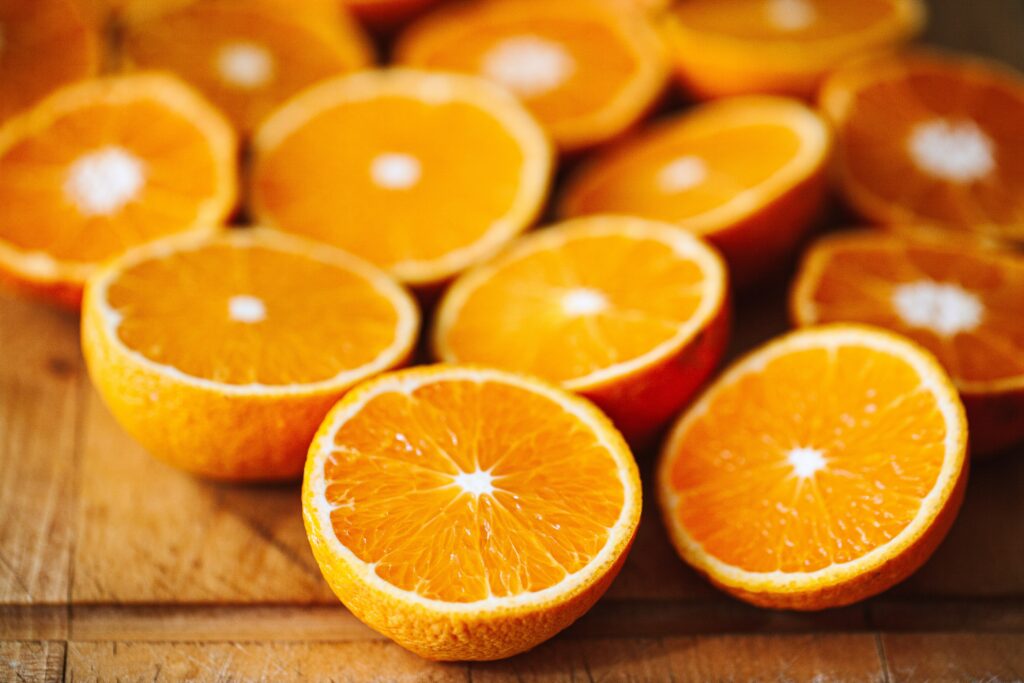The Health Benefits of Cooking With Oranges
go.ncsu.edu/readext?772200
en Español / em Português
El inglés es el idioma de control de esta página. En la medida en que haya algún conflicto entre la traducción al inglés y la traducción, el inglés prevalece.
Al hacer clic en el enlace de traducción se activa un servicio de traducción gratuito para convertir la página al español. Al igual que con cualquier traducción por Internet, la conversión no es sensible al contexto y puede que no traduzca el texto en su significado original. NC State Extension no garantiza la exactitud del texto traducido. Por favor, tenga en cuenta que algunas aplicaciones y/o servicios pueden no funcionar como se espera cuando se traducen.
Português
Inglês é o idioma de controle desta página. Na medida que haja algum conflito entre o texto original em Inglês e a tradução, o Inglês prevalece.
Ao clicar no link de tradução, um serviço gratuito de tradução será ativado para converter a página para o Português. Como em qualquer tradução pela internet, a conversão não é sensivel ao contexto e pode não ocorrer a tradução para o significado orginal. O serviço de Extensão da Carolina do Norte (NC State Extension) não garante a exatidão do texto traduzido. Por favor, observe que algumas funções ou serviços podem não funcionar como esperado após a tradução.
English
English is the controlling language of this page. To the extent there is any conflict between the English text and the translation, English controls.
Clicking on the translation link activates a free translation service to convert the page to Spanish. As with any Internet translation, the conversion is not context-sensitive and may not translate the text to its original meaning. NC State Extension does not guarantee the accuracy of the translated text. Please note that some applications and/or services may not function as expected when translated.
Collapse ▲
During the winter months we think about increasing our intake of vitamin C to boost our immune system. Oranges are a great source of vitamin C. This fruit also contains pectin, which has shown to reduce cholesterol. The flavonoids in oranges may also protect against heart disease, according to research. When choosing oranges, choose fruit that has a firm smooth skin and are heavy for their size.
I love the flavor of fresh oranges in pork and poultry dishes. It makes any meal feel like a special occasion. For a festive dish try this recipe for Orange Glazed Pork Loin from Taste of Home!

Orange Glazed Pork Loin
Ingredients
- 1 teaspoon salt
- 1 garlic clove, minced
- 2 to 3 fresh thyme sprigs or 1/4 teaspoon dried thyme
- 1/4 teaspoon ground ginger
- 1/4 teaspoon pepper
- 1 boneless pork loin roast (5 pounds)
- GLAZE:
- 1 cup orange juice
- 1/4 cup packed brown sugar
- 1 tablespoon Dijon mustard
- 1/3 cup cold water
- 1 tablespoon cornstarch
Directions
- Preheat oven to 350°F. Combine the first 5 ingredients; rub over roast. Place fat side up on a rack in a shallow roasting pan. Bake, uncovered, for 1 hour.
- Meanwhile, in a saucepan over medium heat, combine orange juice, brown sugar and mustard. In a small bowl, mix water and cornstarch until smooth. Add to orange juice mixture. Bring to a boil; cook and stir 2 minutes. Reserve 1 cup glaze for serving; brush half of remaining glaze over roast.
- Bake until a thermometer reads 145°F, 20-40 minutes longer, brushing occasionally with remaining glaze. Let stand 10 minutes before slicing. Reheat reserved glaze; serve with roast.
Nutrition Facts
4 ounces cooked pork with 1 tablespoon glaze: 199 calories, 7g fat (2g saturated fat), 71mg cholesterol, 212mg sodium, 6g carbohydrate (5g sugars, 0 fiber), 28g protein. Diabetic exchanges: 4 lean meat, 1/2 starch.




